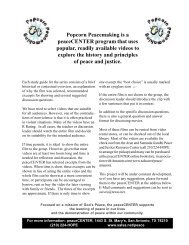LEO TOLSTOY Eleven Stories
LEO TOLSTOY Eleven Stories
LEO TOLSTOY Eleven Stories
Create successful ePaper yourself
Turn your PDF publications into a flip-book with our unique Google optimized e-Paper software.
good man. Then the trial came on: he was charged with<br />
murdering a merchant from Ryazan, and robbing him<br />
of twenty thousand rubles.<br />
His wife was in despair, and did not know what<br />
to believe. Her children were all quite small; one was a<br />
baby at her breast. Taking them all with her, she went<br />
to the town where her husband was in jail. At first she<br />
was not allowed to see him; but after much begging, she<br />
obtained permission from the officials, and was taken<br />
to him. When she saw her husband in prison-dress and<br />
in chains, shut up with thieves and criminals, she fell<br />
down, and did not come to her senses for a long time.<br />
Then she drew her children to her, and sat down near<br />
him. She told him of things at home, and asked about<br />
what had happened to him. He told her all, and she<br />
asked, “What can we do now?”<br />
“We must petition the Czar not to let an<br />
innocent man perish.”<br />
His wife told him that she had sent a petition to<br />
the Czar, but it had not been accepted.<br />
Aksionov did not reply, but only looked<br />
downcast.<br />
Then his wife said, “It was not for nothing I<br />
dreamt your hair had turned grey. You remember? You<br />
should not have started that day.” And passing her<br />
fingers through his hair, she said: “Vanya dearest, tell<br />
your wife the truth; was it not you who did it?”<br />
“So you, too, suspect me!” said Aksionov, and,<br />
hiding his face in his hands, he began to weep. Then a<br />
soldier came to say that the wife and children must go<br />
away; and Aksionov said good-bye to his family for the<br />
last time.<br />
When they were gone, Aksionov recalled what<br />
had been said, and when he remembered that his wife<br />
also had suspected him, he said to himself, “It seems<br />
that only God can know the truth; it is to Him alone we<br />
must appeal, and from Him alone expect mercy.”<br />
And Aksionov wrote no more petitions; gave up<br />
all hope, and only prayed to God.<br />
Aksionov was condemned to be flogged and<br />
sent to the mines. So he was flogged with a knot, and<br />
when the wounds made by the knot were healed, he was<br />
driven to Siberia with other convicts.<br />
For twenty-six years Aksionov lived as a convict<br />
in Siberia. His hair turned white as snow, and his beard<br />
grew long, thin, and grey. All his mirth went; he stooped;<br />
he walked slowly, spoke little, and never laughed, but<br />
he often prayed.<br />
10<br />
In prison Aksionov learnt to make boots, and<br />
earned a little money, with which he bought The Lives<br />
of the Saints. He read this book when there was light<br />
enough in the prison; and on Sundays in the prisonchurch<br />
he read the lessons and sang in the choir; for his<br />
voice was still good.<br />
The prison authorities liked Aksionov for his<br />
meekness, and his fellow-prisoners respected him: they<br />
called him “Grandfather,” and “The Saint.” When<br />
they wanted to petition the prison authorities about<br />
anything, they always made Aksionov their spokesman,<br />
and when there were quarrels among the prisoners<br />
they came to him to put things right, and to judge the<br />
matter.<br />
No news reached Aksionov from his home, and<br />
he did not even know if his wife and children were still<br />
alive.<br />
One day a fresh gang of convicts came to the<br />
prison. In the evening the old prisoners collected round<br />
the new ones and asked them what towns or villages they<br />
came from, and what they were sentenced for. Among<br />
the rest Aksionov sat down near the newcomers, and<br />
listened with downcast air to what was said.<br />
One of the new convicts, a tall, strong man of<br />
sixty, with a closely-cropped grey beard, was telling the<br />
others what be had been arrested for.<br />
“Well, friends,” he said, “I only took a horse that<br />
was tied to a sledge, and I was arrested and accused of<br />
stealing. I said I had only taken it to get home quicker,<br />
and had then let it go; besides, the driver was a personal<br />
friend of mine. So I said, ‘It’s all right.’ ‘No,’ said they,<br />
‘you stole it.’ But how or where I stole it they could not<br />
say. I once really did something wrong, and ought by<br />
rights to have come here long ago, but that time I was<br />
not found out. Now I have been sent here for nothing at<br />
all... Eh, but it’s lies I’m telling you; I’ve been to Siberia<br />
before, but I did not stay long.”<br />
“Where are you from?” asked some one.<br />
“From Vladimir. My family are of that town. My<br />
name is Makar, and they also call me Semyonich.”<br />
Aksionov raised his head and said: “Tell me,<br />
Semyonich, do you know anything of the merchants<br />
Aksionov of Vladimir? Are they still alive?”<br />
“Know them? Of course I do. The Aksionovs<br />
are rich, though their father is in Siberia: a sinner like<br />
ourselves, it seems! As for you, Gran’dad, how did you<br />
come here?”





